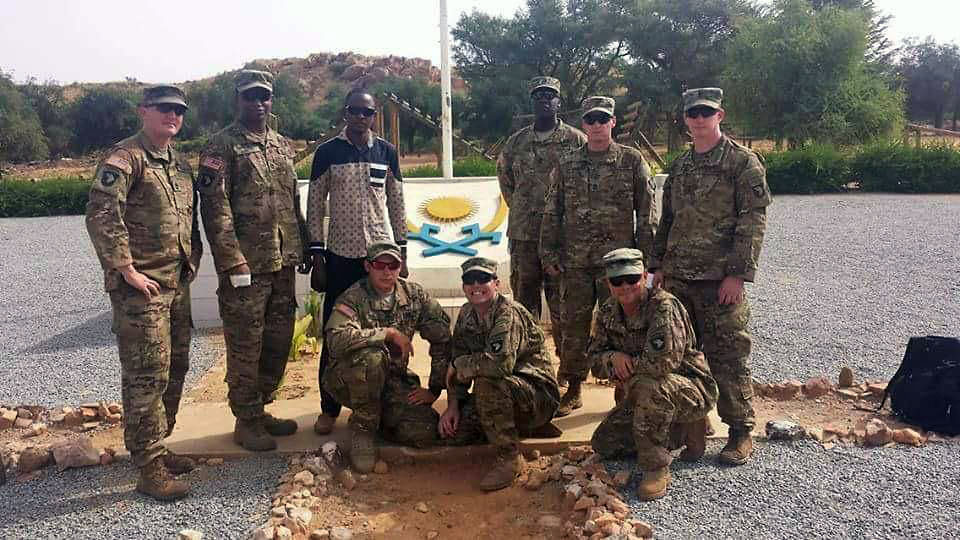Written by Captain Jason Welch
U.S. Army Africa
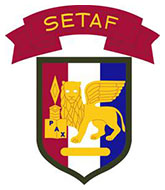 Niamey, Niger – Soldiers of the 1st Brigade Combat Team, 101st Airborne Division partnered with members of the Forces Armees Nigeriennes (FAN) to observe and mentor the training cadre of the Nigerien basic combat training school from October 13th to November 16th at the Tondibiah Training Base in Niger.
Niamey, Niger – Soldiers of the 1st Brigade Combat Team, 101st Airborne Division partnered with members of the Forces Armees Nigeriennes (FAN) to observe and mentor the training cadre of the Nigerien basic combat training school from October 13th to November 16th at the Tondibiah Training Base in Niger.
The 1st Brigade Combat Team, 101st Airborne Division, is the regionally allocated force supporting U.S. Army Africa events and exercises across the African continent this year.
The soldiers came from the 2nd Battalion, 327th Infantry Regiment and traveled from Fort Campbell, Kentucky, to Niger to assess how the FAN was conducting basic training of new soldiers and to share U.S. Army methods, but they also learned some lessons of their own.
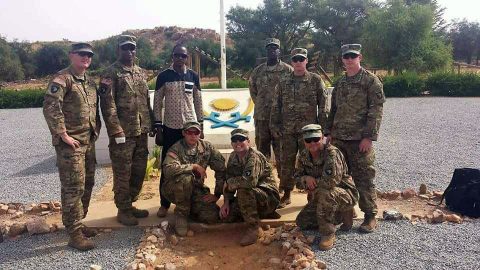
Prince learned the “importance of time management, utilizing all resources available, planning, dissemination of information, and proper training of experienced instructors.”
“What I will take back to my formation is the basics. In any Army, no matter the budget or size, the basics are imperative to achieve success,” said Prince.
“This mission allowed our team to learn from their mistakes, and our lessons learned will help out other units once we pass on what we have learned. The feedback we gave to the Nigerien officers will help them teach their basic training recruits and better prepare them,” said team member Staff Sgt. Matthew England.
The team’s officer in charge, 1st Lt. Daniel Godlasky, also shared lessons learned.
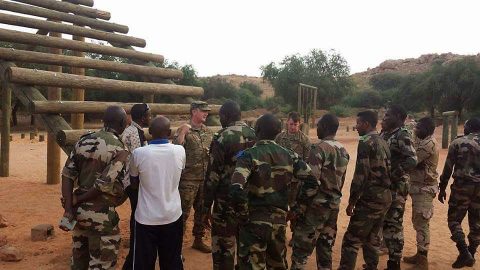
“This Niger mission will generate readiness in our own formation not only with our own training, but in our future USARAF missions as well,” said Godlasky.
“This team, comprised mostly of senior noncommissioned officers, has learned the significance of training on the basics. Once the basics are established then complexities can be added,” said Godlasky.
“We also learned multiple methods of communicating to our soldiers, which will allow us to cater to different learning types when training. For future missions with USARAF this has given our unit a baseline for what to expect and what we must to do prepare for extended trips here,” said Godlasky.
Prince, Godlasky and the rest of the team spent four weeks embedded with the Nigerien training cadre, working and living alongside each other on a daily basis.
“The team felt extremely privileged to have been able to work with such a professional, disciplined, and virtuous organization,” said Godlasky. “We were able to learn a lot from them when dealing with communication barriers and that is invaluable information.”
The military-to-military exchange was an important part of ongoing efforts to build stronger partnerships between U.S. Army and Nigerien troops and to increase the capacity of Nigerien forces to provide regional stability and security.
“The local populace is extremely receptive to their military, and FANs abilities to protect them from the many threats that the Nigeriennes experience,” said Godlasky.
Some of the areas of focus that the U.S. and Nigerien soldiers focused on during the training were basic soldiering skills including tactical movement, react to contact drills, rifle maintenance and marksmanship, and the confidence obstacle course built at the training site.
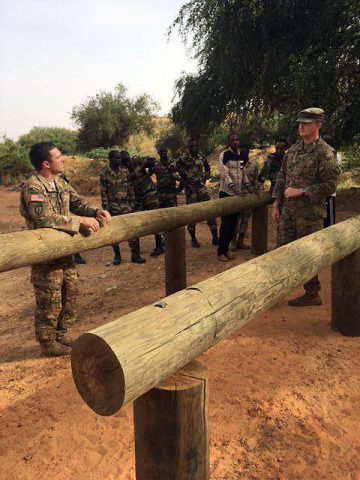
“This reinforced the importance of training my squad on infantry basics,” said team member Staff Sgt. Cameron Marsh.
The team first helped the cadre negotiate the basic training obstacle course and then helped them teach the obstacle course to their students, said Marsh.
In addition to marksmanship and combat tactics, recruits learned about Nigerien military rules and regulations, the law of land warfare, and other basic soldier skills and knowledge to help them serve successfully in the Nigerien military.
“The Niger Army is very professional. The Soldiers are very motivated and disciplined. They are very eager to learn and train,” said England.
The Nigerien basic training course provides a commonality that increases interoperability between different African partner militaries that often face similar threats and challenges across the region.
“I think our presence has strengthened our relationship, which will allow for greater success in our efforts to create a lasting partnership with Niger,” said England.
The Nigerien troops that complete the basic training will have a baseline that allows them to work alongside any other military force that uses similar training including the U.S. and other African partners. By increasing interoperability between African partners like Niger, partner militaries increase their ability to counter violent extremists and provide regional security.
This partnership helps improve the basic training program so Soldiers will be able to combat those threats from across the region, said Godlasky.
“This not only improves the safety for the Soldier by better preparing them, but also helps build a safe Niger,” said Godlasky.

